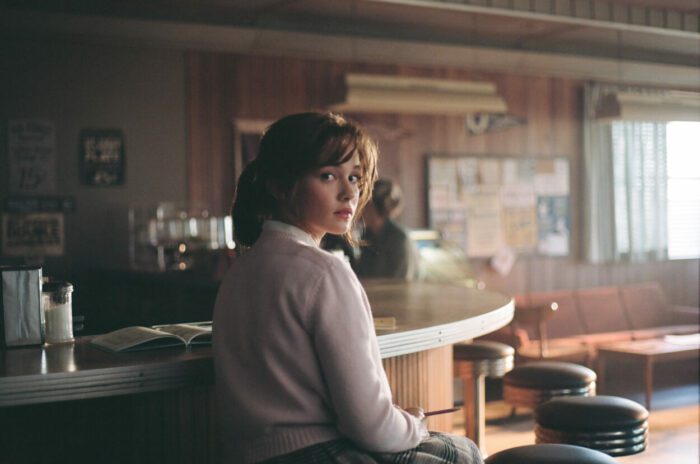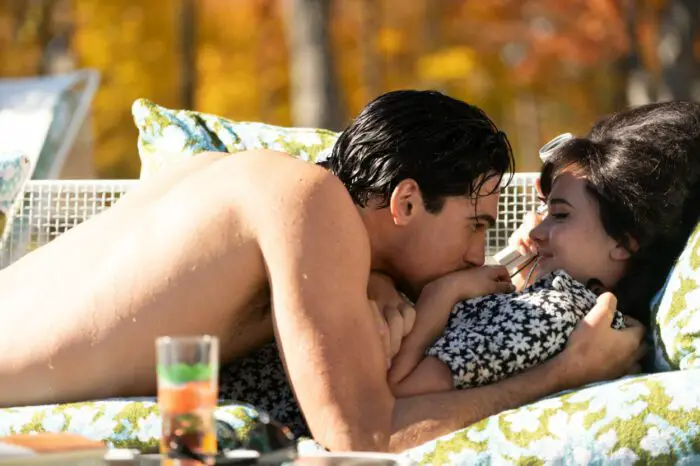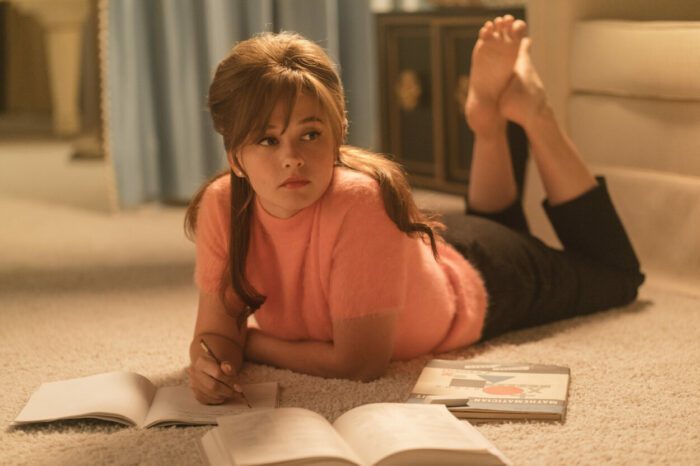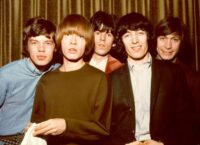In less than two years, we’ve had two movies about Elvis and Priscilla Presley grace the silver screen. In reality, however, Baz Luhrmann’s Elvis doesn’t give Priscilla the respect or the screen time she deserves. One of that movie’s shortcomings is that it is an unabashed and bloated puff piece about Elvis, refusing to delve into the more problematic aspects of the King of Rock’s superstar personality. Sofia Coppola’s subtle yet impactful Priscilla puts the Queen of Graceland at the center and serves as an antidote to 2022’s Elvis.
Based on Priscilla’s memoir Elvis and Me, there is no better person than Coppola to adapt her story. Coppola’s female protagonists are princesses coming of age in glass castles that are ready to crumble. From the moment 14-year-old Priscilla Beaulieu met 24-year-old hot shot and uber-popular Elvis Presley, her Sofia Coppola protagonist arc began. It was inevitable that Coppola would direct Priscilla’s biopic and, even if Priscilla didn’t exist, Sofia undoubtedly would have made a character just like her. It’s a match made in nightmares-disguised-as-dreams heaven.
Because that’s what life with Elvis and living in Graceland was like. From the outside, Priscilla was living every young girl’s dream in the 1960s. All the girls had their eyes on Elvis and he—most of the time—had his eyes on Priscilla. She wasn’t dissimilar to all those girls, she also fawned over Elvis and wanted to be with him. But, what she didn’t realize, is that her dream coming true would be coming at a cost. A cost that would define her life going forward.

Within the first 10 minutes, we see Elvis and Priscilla meet for the first time at a party in Germany (where Elvis was stationed, along with Priscilla’s father) and it sets the whole stage perfectly. We can see immediately why everyone loves Elvis—he’s the life of the party, immensely charismatic, and has killer looks. As he moves to Priscilla, almost in an ominous fashion, things become uneasy. Casting two actors with drastic height differences was a masterstroke by Coppola, as Jacob Elordi’s towering length casts a literal and figurative shadow over Cailee Spaeny and drives the inherent ickiness of their relationship home.
But, why did Elvis want Priscilla? What was it that made her stand out among hundreds of thousands of girls? It all comes down to control. One thing Luhrmann’s Elvis coveys is the power Colonel Tom Parker had on the rockstar and Priscilla hints at the power Elvis’ father Vernon had over him, specifically in Graceland matters. So, for one of the most famous and powerful people on the planet, Elvis had a shocking lack of agency. In choosing Priscilla, he used their large age difference to assert his control over her. For once, he was the one who wielded the power and it came at the cost of robbing Priscilla of her innocence. Coppola isn’t afraid to call a spade a space—she effectively and skillfully shows how Elvis groomed Priscilla.
Whether it was telling Priscilla to finish her schooling close to Graceland, changing her hair color to her eye makeup, all the way to giving her uppers and downers, Elvis molded Priscilla into his version of an ideal woman. As the movie goes along, the Priscilla that we saw at the beginning of the movie slowly fades away. It’s really unsettling, tragic, and honest. As frivolous and fun as Elvis is, it can’t give a true account about Elvis. Coppola, thus far, has made the definitive film on the portrayal of Elvis Presley. And a lot of that has to do with Elordi’s portrayal of Elvis.

We have a lot of baggage with Elordi playing Nate Jacobs on Euphoria and that baggage works wonders in his performance as Elvis. I don’t want to pin Austin Butler and him against each other since each performance works in their respective movies. However, I think Elordi’s performance feels more effortless versus Butler’s outing is much more laborious and sweaty. Elordi’s natural good looks convincingly show us why girls were fawning over him. But the Nate Jacobs of it all is exactly why this performance works. When Elvis is acting creepy or being abusive, we instantly believe it and it gives a necessary and unsettling layer to the iconography of Elvis. It’s not a showy performance by any means, but I think I like it more and more as time goes along. This is the opposite of Spaeny’s performance, which I instantly loved the movie ended.
Coppola, along with perhaps Greta Gerwig, is the premier director of actresses. Whether it be Scarlett Johansson in Lost in Translation or Kirsten Dunst in Marie Antoinette, she has the ability to create transcendent performances for women and Spaeny is a welcome addition. It is incredible how Spaeny is able to capture the essence of Priscilla Presley at these major stages of her life without saying much. Her silence speaks louder than anything, just like the real Priscilla’s silence probably did. She doesn’t get loud outbursts to show that she’s losing her sense of self, but rather through small details Spaeny effectively conveys Priscilla descent into Graceland at major stages of her life. This is a very difficult part and I am astounded how unbelievable Spaeny is—she is a movie star.
Both Spaeny and Elordi are perfect fits for the Sofia Coppola aesthetic. Even though the core of this movie is Priscilla’s nightmare, the exterior of the film is always in a dreamlike state. I can say this confidently, I don’t think there is a better looking movie that has come out this year. Coppola goes back to her candy pop era and splashes bright colors on the screen—the carpets, the eyeshadow, the cars. Both leads are absolutely stunning and stun even more when wearing their luxurious and mouth-dropping Chanel and Valentino outfits. But, the aesthetic serves more of a purpose than eye-candy. The glamour of the Elvis experience makes Priscilla’s experience that more haunting. That, even when things looks so beautiful, it could not have been more rotten and ugly.

Let me reiterate, this is not Elvis and doesn’t exist in the same sphere as Elvis. Priscilla almost feels like the movie in between every scene of Elvis that didn’t make it. It’s very patient, subtle, and quiet—in other words, it’s a Sofia Coppola movie. At times, especially toward the second half, it feels the movie is too subtle and could have benefitted from being more explicit in its narrative and characters. It also feels in this portion, the movie sometimes forgets it’s about Priscilla and you wish the focus would go back to her. No spoilers here, but the ending does feel abrupt and will catch you off guard. In a film with tremendous needle drops, the last one is so well-placed and leaves you thinking long after you exit the theater about Priscilla’s connection to Elvis.
Oddly enough, the Elvis song I thought about while watching Priscilla was “Jailhouse Rock.” Priscilla thought this would be a rocking life with Elvis. He was the King of Rock and she would be his Queen. They would rule together over Graceland and live happily ever after. But, just like Sofia Coppola’s other princesses, reality isn’t the same as dreaming. Graceland isn’t a castle—it’s a jailhouse.



